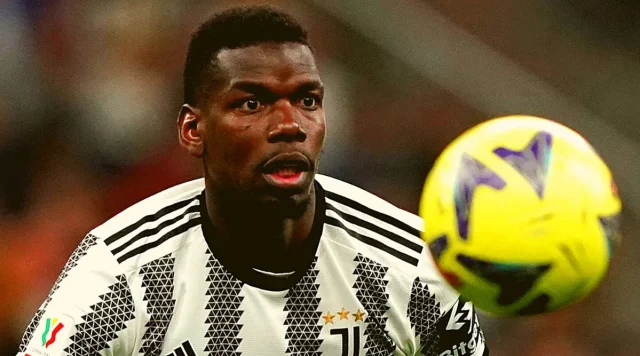Paul Pogba has been suspended from football for four years after a failed anti-doping test.
Juventus midfielder Pogba, 30, believes the verdict is “incorrect” and will appeal against it at the Court of Arbitration for Sport (CAS).
Pogba was initially handed a provisional suspension by NADO Italia (the Italian Anti-Doping Organisation) in September after the failed test, which followed his side’s 3-0 win at Udinese on August 20.
FIFA’s guidelines for suspensions on players who violate its anti-doping regulations ranges between two and four years, depending on whether it can be proven that the rule violation was intentional.
“I have today been informed of the Tribunale Nazionale Antidoping’s decision and believe that the verdict is incorrect,” Pogba said in a statement.
“I am sad, shocked and heartbroken that everything I have built in my professional playing career has been taken away from me. When I am free of legal restrictions the full story will become clear, but I have never knowingly or deliberately taken any supplements that violate anti-doping regulations.
“As a professional athlete I would never do anything to enhance my performance by using banned substances and have never disrespected or cheated fellow athletes and supporters of any of the teams I have played for, or against.
“As a consequence of the decision announced today I will appeal this before the Court of Arbitration for Sport.”
The France international was initially suspended in September after his test detected testosterone not produced by the body, according to NADO Italia.
NADO said that testosterone not produced by the body was detected in the ‘A sample’ Pogba provided. Following Pogba’s provisional suspension, his ‘B sample’ was sent for further tests at the Acqua Acetosa clinic in Rome, which is where the failed test was confirmed.
Pogba was an unused substitute in the match against Udinese which preceded his failed test, but he did come off the bench in the club’s subsequent two Serie A matches — a 1-1 draw at home to Bologna and a two-goal victory at Empoli.
Pogba returned to Juventus in the summer of 2022 following six years at Manchester United, but fitness issues restricted him to just 10 appearances in the 2022-23 campaign.
The most recent of the midfielder’s 91 caps for France came in March 2022, and his two substitute outings are his only two appearances of this season.
Pogba is under contract at Juventus through to the summer of 2026.
Juventus are currently second in Serie A, 12 points behind league leaders Inter, are next back in action with a league trip to Napoli on March 3.
So, does Pogba’s ban apply worldwide?
Pogba has been banned by NADO Italia, which oversees all athletes in the country and is a “functional body” of the World Anti-Doping Agency (WADA).
FIFA and NADO Italia are both signatories on WADA’s World Anti-Doping Code (WADC) — “the definitive anti-doping rulebook”. FIFA also sets its own football anti-doping rules in line with the WADC.
The WADC is a comprehensive 181-page document which outlines the anti-doping regulations but the key part of it in relation to Pogba’s ban is as follows:
“A decision… imposing a period of ineligibility (after a hearing has occurred or been waived) automatically prohibits the athlete or other person from participation in all sports within the authority of any signatory for the period of ineligibility.”
This essentially means that Pogba’s ban automatically applies to all the signatories to the WADC — which includes FIFA and almost every country’s anti-doping agency in the world. The same applies if the Court of Arbitration for Sport (CAS) upholds Pogba’s ban after appeal.
What are anti-doping rules?
Anti-doping rules exist within football to ensure nobody gains an unfair competitive advantage and to protect a player’s health. The World Anti-Doping Agency sets out a code which most sporting organisations around the world follow.
FIFA’s website says “it is the player’s strict responsibility to make sure that their body does not come into contact with any prohibited substance or method” and that they should check every medication or treatment they receive.
The World Anti-Doping Agency (WADA) has a list, which it regularly updates, of prohibited substances and methods. Athletes are only allowed to use prohibited substances or methods if they have a legitimate medical reason and are granted a therapeutic use exemption (TUE).
For example, the British cyclist Sir Bradley Wiggins was granted a TUE ahead of the 2012 Tour de France which allowed him to take the corticosteroid Triamcinolone to treat asthma — Wiggins went on to win the event. Triamcinolone was added to WADA’s prohibited list in 2014 as it also has performance-enhancing properties, namely allowing athletes to reduce their weight without suffering a significant loss in power.







































